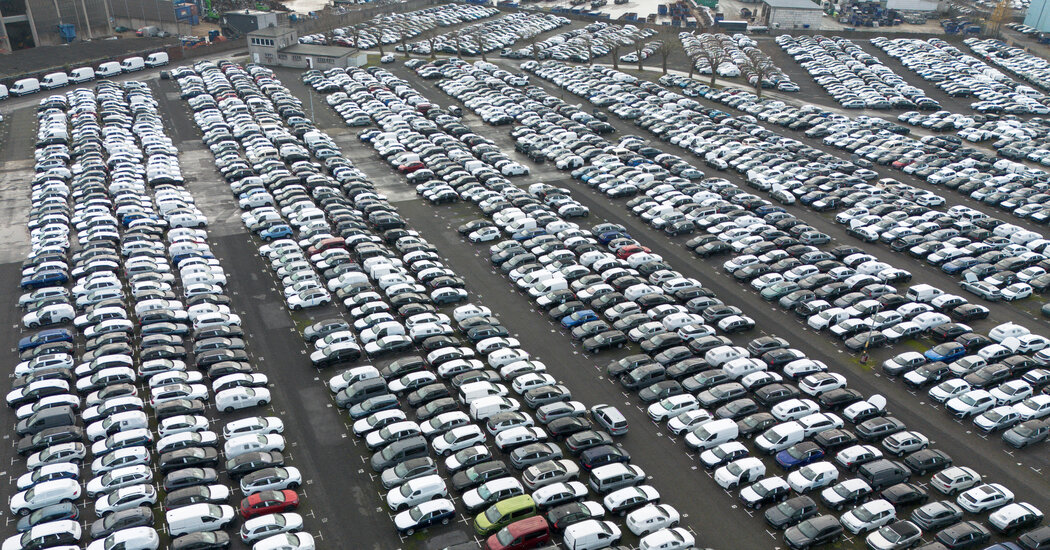The country that the Trump management slapped with the heftiest tariff this week is a small, rural, landlocked nation in southern Africa that is without doubt one of the global’s poorest.
Lesotho, which makes denim that is going into American-branded denims, used to be hit with a 50 p.c tariff. It used to be amongst a number of lower-income international locations at the continent that had been stunned through levies top above the minimal 10 p.c imposed on the vast majority of The united states’s buying and selling companions. Madagascar, the place three-quarters of the inhabitants lives in poverty, now will probably be met with a 47 p.c tariff when its attire, vanilla and different exports input the US.
Merchandise from Algeria, Angola, Botswana, Libya and Mauritius all now have price lists above 30 p.c, as does South Africa, which has come below explicit attack through the Trump management.
Mr. Trump has justified the across-the-board price lists through mentioning that the arena buying and selling gadget has performed the US for a chump who picked up the tab for the arena’s moochers.
However Lesotho is hardly ever a large participant in international business: It imported not up to $3 million in goods from the US and exported $240 million there ultimate yr.
The price lists come as a lot of the African continent is already reeling. Simply weeks in the past, the Trump management ended billions of bucks in support to Africa that undergirded many nations’ well being care techniques and crisis reduction efforts.
On the identical time, governments around the continent are dealing with a international debt load that exceeds $1.1 trillion. Many are spending extra on repaying their loans than on well being care or schooling.
For probably the most phase, manufactured exports from Africa to the US are minuscule. However to international locations like Lesotho, the have an effect on of price lists is big. Exports of denim and diamonds make up greater than a 10th of the rustic’s gross home product.
This may increasingly “devastate the economic system,” mentioned Jacques Nel, head of Africa Macro at Oxford Economics, a analysis company. Lesotho is already a deficient nation. It has a inhabitants of 2 million and its complete nationwide output is ready $2 billion a yr, with an annual according to capita revenue of $975.
“This has not anything to do with precise price lists,” Mr. Nel mentioned. “They may be able to’t import so much from the U.S., as a result of they don’t have some huge cash.”
The textile business is Lesotho’s largest personal employer and produces its number-one export. The field used to be nurtured after the US passed the African Growth and Opportunity Act in 2000. Designed to spice up production around the continent, the legislation got rid of maximum tasks on items from sub-Saharan Africa. That legislation expires later this yr, even if Mr. Trump successfully ended it this week.
Lesotho’s factories have made clothes — in particular denim — for producers like Levi’s and Wrangler. And even if Mr. Trump just lately called Lesotho a rustic that “no person has ever heard of,” his personal Trump-branded Greg Norman golf shirts function labels that say “Made in Lesotho.”
Lesotho’s business minister, Mokhethi Shelile, mentioned the rustic has 11 factories that make use of 12,000 staff. Seventy p.c of what they produce is exported to the US. “We’re a small economic system,” Mr. Shelile mentioned. “We simply have to talk to the U.S. management since the tariff isn’t in keeping with details.”
Different best exporters of textiles in Africa, like Madagascar (47 p.c tariff) and Kenya (10 p.c), can even really feel the edge.
As a result of South Africa does extra business with the US, exporting cars, agricultural items and extra, it is going to be most influenced, mentioned Thea Fourie at S&P World Marketplace Intelligence.
African countries whose primary exports are power or positive important minerals will probably be spared since the management has exempted the ones pieces from price lists.
Whilst the US is implementing price lists at the moderately small quantity of products from Africa — simply $39 billion price ultimate yr — China has been seeking to inspire business. It eradicated all import tasks on merchandise from 33 African international locations in December.
A larger worry is the knock-on results that the price lists are anticipated to have at the international economic system. The outlook has dimmed over the last week and analysts predict slower enlargement.
“Even African international locations no longer dealing with very top price lists are going to be struggling,” mentioned Jayati Ghosh, an economist on the College of Massachusetts at Amherst.
As is the case with any international downturn, the poorest international locations will really feel the sharpest results. Worsening financial possibilities may just gradual business with different companions like China and Europe. It additionally discourages traders.
If inflation activates central banks to lift rates of interest, African international locations with huge debt burdens are in for a double whammy. Their mortgage bills — maximum of that are priced in greenbacks — will building up on the identical time that their talent to earn foreign currency echange thru exports is crippled.
Mavis Owusu-Gyamfi, the manager vice chairman of the African Middle for Financial Transformation, mentioned the one manner ahead is to increase regional business networks inside the continent, a long-running purpose.
The continent has to search for “alternatives to construct intra-African business,” she mentioned.
Zimasa Matiwane contributed reporting from Lesotho.



